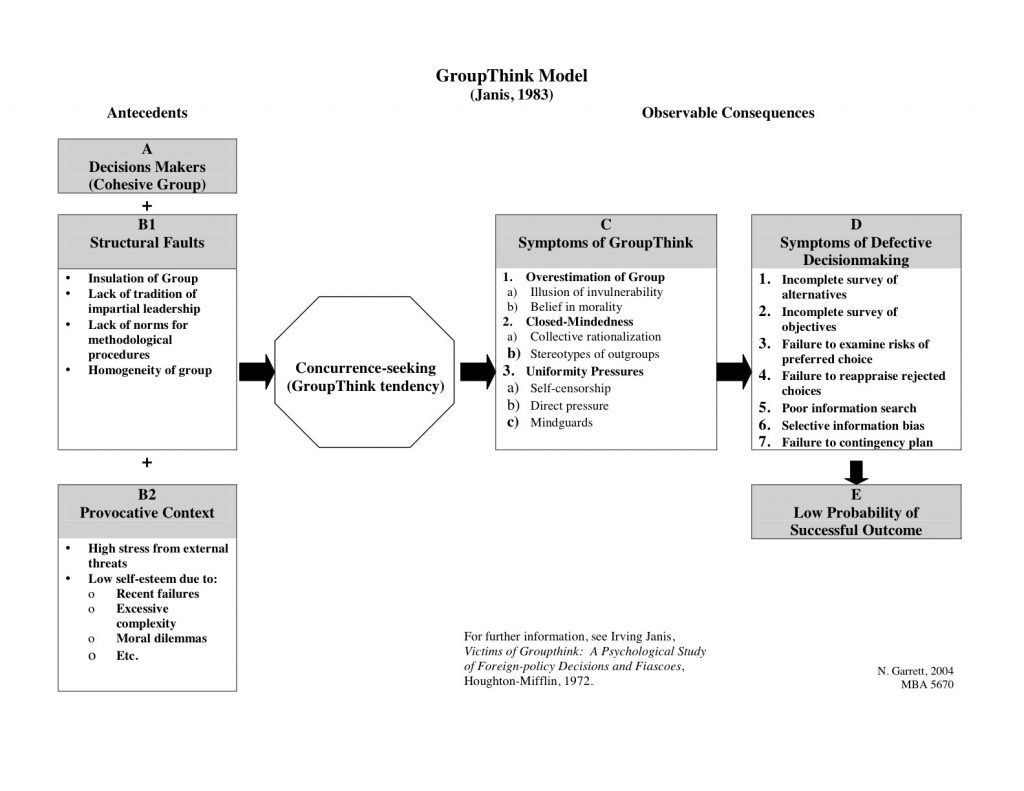 The Danger of Groupthink in Litigation
The Danger of Groupthink in Litigation
Shelton Law Carolinas
(803) 670-0024
Inspired by the Orwell novel 1984, William H. White, Jr. coined the term “groupthink” to refer to rationalized conformity. Groupthink has been blamed for the Bay of Pigs debacle and the Challenger tragedy.
In the early 1970s, psychologist Irving Janis identified eight symptoms of groupthink and organized them into three types:
Type I: Overestimations of the group — its power and morality
- Illusions of invulnerability creating excessive optimism and encouraging risk taking.
- Unquestioned belief in the morality of the group, causing members to ignore the consequences of their actions.
Past experience or arrogance can lead the group to believe that failure is simply not possible. Military history is awash in examples of this symptom.
Regarding righteousness, litigators often hear statements like “jurors will be outraged when I tell them what happened” or “no court in the country would let them get away with this!” Guess what. There is a chance that the jurors be bored when you reveal your bombshell at 4:15 p.m. on Friday afternoon; and that horrible thing the defendant did to you may be allowed in the contract you signed.
Type II: Closed-mindedness
- Rationalizing warnings that might challenge the group’s assumptions.
- Stereotyping those who are opposed to the group as weak, evil, biased, spiteful, impotent, or stupid.
We are right. Therefore, those who oppose us are ignorant and evil. Sound familiar?
An exhausting day of mediation with a good mediator is the best cure for close-mindedness. Mediation allows the parties to discuss the dispute across the table with a mediator raising questions that one side of the dispute previously ignored or dismissed when they were raised by the enemy.
Type III: Pressures toward uniformity
- Self-censorship of ideas that deviate from the apparent group consensus.
- Illusions of unanimity among group members, silence is viewed as agreement.
- Direct pressure to conform placed on any member who questions the group, couched in terms of “disloyalty”
- Mindguards— self-appointed members who shield the group from dissenting information.
These symptoms, which are common in litigation, usually occur when: (1) the attorney spends 100% of the time as advocate and 0% of the time as counselor (the “bulldog”), or (2) when the client attacks his or her lawyer for identifying risks or problems with the case.
The client may ask the lawyer something like, “whose side are you on?” Sophisticated or institutional clients who have been through litigation usually do not ask questions like this. When asked this question, the lawyer must explain the difference between the lawyer’s private role as counselor and the lawyer’s public role as advocate.
Take Away
It is not enough to recognize symptoms of groupthink. Litigators and clients should take affirmative steps to prevent groupthink from corrupting the decision-making process. Otherwise, the consensus of a cohesive, self-righteous group of brilliant intellectuals may be to steer the ship straight into the rocks.
Attr.: https://en.wikipedia.org/wiki/Groupthink.

